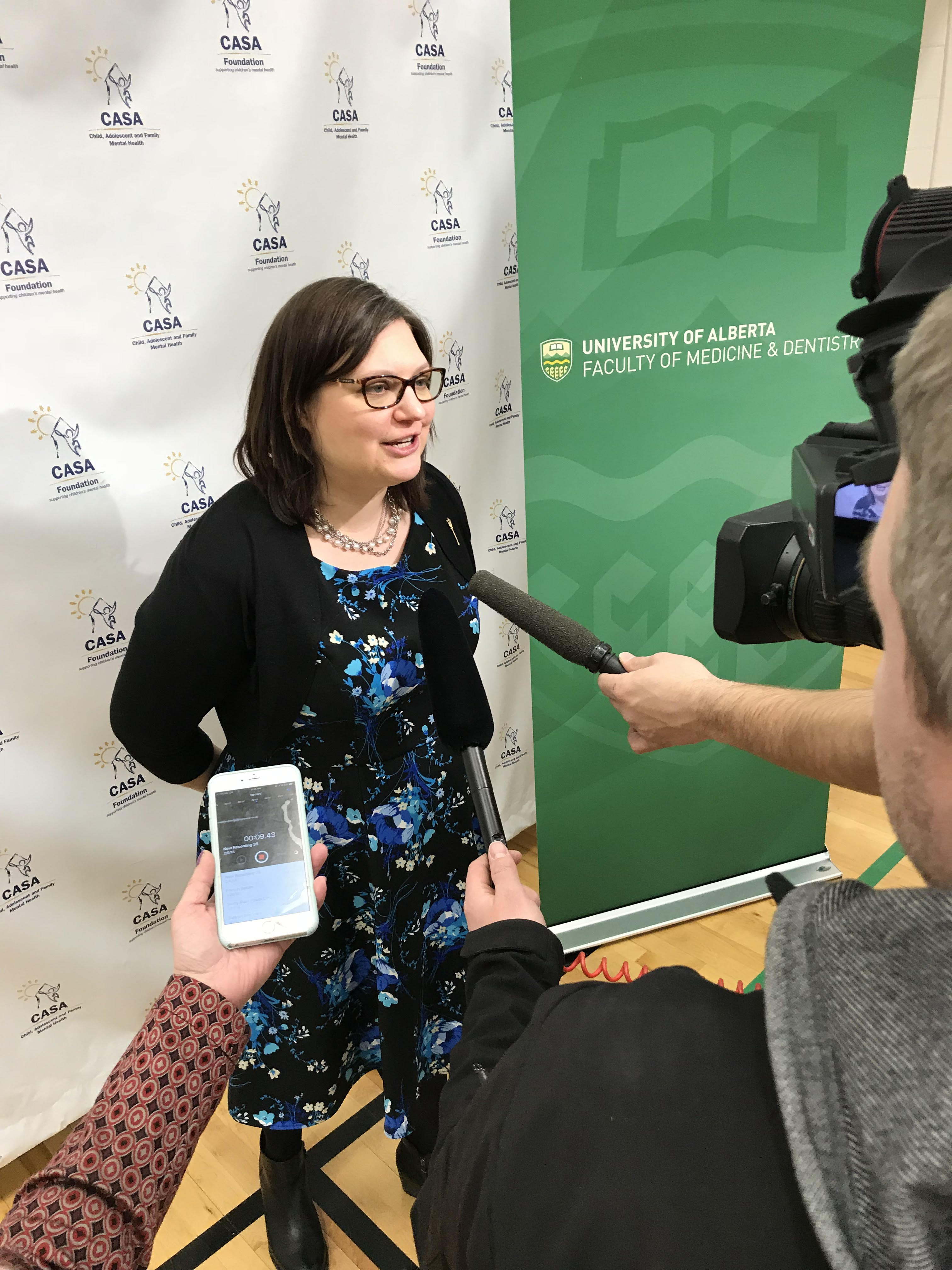
An intense global search is about to get underway to identify a top-level candidate for the newly created CASA Research Chair in Child and Adolescent Mental Health.
The recruitment effort, which is expected to take six months to a year to complete, follows a 10-year, $5 million funding commitment to the University of Alberta's Department of Psychiatry by CASA, Child, Adolescent and Family Mental Health.
"Our expectation is that in the coming month we're going to do a joint posting between CASA, the Department of Psychiatry and Alberta Health Services (AHS)," says Scott Phillips, the Department's Assistant Chair, Administration.
"The position is going to be posted globally in leading periodicals, with the goal of finding someone who is at the very least in their mid-career. Our top priority is to find someone with an international reputation and a strong translational research background who has worked closely with clinicians in child and adolescent psychiatry."
Since the posting is bound to attract qualified applicants from around the world, Phillips says the successful candidate may have to obtain a Canadian work permit or visa before relocating to Edmonton. If so, this could delay the actual appointment by a few months, he notes.
CASA, a pioneering, uniquely-structured, community-based provider of mental health services for infants, children, adolescents and their families, offers 22 programs that serve the needs of more than 4,300 children and families annually. With four Edmonton-area locations, CASA is the primary teaching site for child psychiatry at the University of Alberta.
The much-anticipated $5 million funding announcement, made in early February at CASA Centre in Edmonton, was attended by an enthusiastic throng of guests from CASA, the University of Alberta, Alberta Health Services, the Edmonton Public School Board, and other key local organizations.
"Here at CASA we pride ourselves on using the best research possible so that we can inform our clinical care. We also pride ourselves on conducting evaluations of each program that CASA runs in order to make sure we are providing the best possible care and making changes when we need to," CASA CEO Dr. Denise Milne told the crowd.
"But we know more resources are needed and we know we cannot do this alone. Our partnership with the University of Alberta will help us find answers to the questions that improve care for our children and families," she added.
"The CASA Research Chair will be a 10-year position bringing top research talent to Edmonton to work on projects that align with both the Government of Alberta's renewed focus on quality mental health, as well the specific program needs of CASA and our families."
Brandy Payne, Alberta's Associate Minister of Health, was among the distinguished guests on hand to celebrate the creation of the new CASA Research Chair. Payne extolled the benefits of CASA's partnership with the University of Alberta's Department of Psychiatry.
"The establishment of a new Research Chair in Child and Adolescent Mental Health provides a fantastic opportunity for CASA and the University of Alberta to advance evidence-based mental health care for young people in our province," Payne said.
"The children and families who enter CASA's care can already expect to have a skilled team that takes a coordinated approach to help them manage their mental health. This new collaboration with the University of Alberta is a wonderful opportunity to bring leading edge research to the front lines."
CASA's relationship with the University of Alberta dates back to an affiliation agreement that was struck in 1997. More than two decades later, the new CASA Research Chair represents the fulfillment of a dream that flowed from that partnership.
"Today marks a giant step forward for the province of Alberta to become an international leader in child and adolescent mental health research, and CASA is at the centre of it," said Dr. Xin-Min Li, Chair of the Department of Psychiatry.
"There is a need for research with a specific focus on our younger generations. They should not be diagnosed and treated the same way as adults. Having the support of CASA, an amazing organization, we'll bring in more talented scientists, scientists' methodology, and committed health professionals to investigate these important subjects."
Once they're in place, CASA's new Research Chair, along with two clinician-scientist associates, will be located at CASA Centre in Edmonton, where they will work closely with the organization's existing staff of clinicians. CASA already boasts an impressive multi-disciplinary team of psychiatrists, psychologists, pediatricians, social workers, nurses and behavioural specialists.
"Our dream is that the CASA Research Chair will work on projects of immediate importance to Edmonton families, by working closely with CASA and our various community partners. When we join forces to answer important questions about childrens' mental health, our care, our families, and our communities will grow stronger," said Milne.
Other prominent guest speakers echoed those sentiments, including Dr. Dennis Kunimoto, Acting Dean of the University of Alberta's Faculty of Medicine & Dentistry; Michelle Anderson-Draper, Chair of the Edmonton Public School Board; Faye Parker, CASA's Board Chair; and Candace Fehr, Co-Chair of the CASA Family Advisory Council.
But perhaps the most compelling comments came from Caleb Chomay, a 19-year-old member of the CASA Youth Council. Chomay relayed the intensely personal and painful story of his own lonely childhood battle with depression and anxiety issues. It was only after he engaged in self-harm at the age of 14 that his illness was diagnosed, he said. That's when he began taking anti-depressant and anti-anxiety medications, while undergoing years of therapy that eventually brought him back to a state of mental health.
"I believe research into mental health is incredibly important. If society, teachers, doctors and parents had a better understanding of mental health then there wouldn't have to be children that suffer from mental illnesses alone," he said.
"Most importantly, we can reduce the stigma around youth mental illness, and let our teachers, parents, and doctors know that it does exist," he added. "Hopefully, some day kids will not have to grow up the way I did."